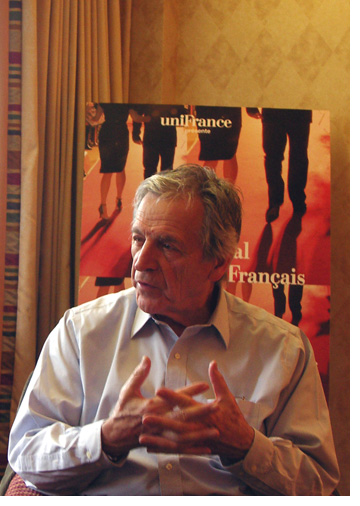|
| 1 | 2 | 3 | |
 Is the aim to make it easier for the audience to come in to learn more?
Is the aim to make it easier for the audience to come in to learn more?
I have given a few examples and the great works in the history of cinema is all entertainment. To see a film, is different from hearing a lecture at the university and attending a political rally. What the people think is entertainment is when the work talks about people. Of course it would have to be told with talent, but as it talks about people, it will have to describe effectively the society the person functions in. Then on can delve into the world and connect with it. And later, possibly find the possibility to think about it. That is the best entertainment.
In this film, speaking for myself, there seemed to be instances where there was humor. Was this a conscious choice to bring in humor?
Of course, it depends on the theme, but for this particular film, I wanted to bring in a touch of irony. Initially, the film will trigger a certain emotion. One may like it or hate it or may laugh or cry. Only after a certain emotion is aroused, will you have the audience thinking.
I felt that because the main character cannot speak the tongue of the places he is in, the audience can concentrate on the act of seeing. And I also read about your lecture on silent films at the cinematheque. Can you tell me your ideas on the balance of sound and moving pictures?
Films made in the silent era and silent films were the most beautifully made in the world. Later, when sound was introduced and it was natural to lead into talkies. But even with the addition of sound, there are many films that have not bettered with it. When you create sound in films, you have the person, and then use the sound, and I have always believed that the use of it required in the dramaturgy. So I donít believe that even if it is an intellectually challenging film, the sound should be worked on a lot. There is logic in the sound and logic in the person. I believe there has to be a connection in between. It works to the advantage of this film that, since the character cannot speak the language he is in, he has to use his eyes and his body to get by. He has to understand the society he was suddenly allowed to enter, the society that was unknown to him by the mere act of seeing. He cannot do this by using language. This makes it difficult for the actor as well as the director but at the same time interesting. So without using language, we had to find solutions to make him find the motive to act.
Is this line of storytelling limited to this film, or is this something you wish to pursue in future films?
It is limited to this film. This story brought this style. Each story should bring each style that matches the story. At least, I believe I have been able to do so in each film I have made so far.
As a last question, do you have hope in cinema?
I believe there is a future. It will be a very different future from the past. I think we live now in revolutionary times. This is because digital was introduced. There are many aspects that have changed with digital technology and cinema will continue to change. The economics of cinema will change, the aesthetics of cinema will change, and the way films being promoted, the way it is shown will change. We are already seeing this change in cinema but this we will be seeing more and more of this. We are not sure how it will be in France, but we know change will be rapid. This change in digital will make various ways of storytelling possible.
The first revolution in cinema was the transition from silent films to talkie. In this process, many directors and actors have disappeared. The aesthetics in cinema has changed and the economy in cinema as well. The way of making films has changed. And a similar revolution is happening now. However, this revolution is far greater than the first and will be sure to bring about a bigger change.
The first revolution in cinema was the transition from silent films to talkie. In this process, many directors and actors have disappeared. The aesthetics in cinema has changed and the economy in cinema as well. The way of making films has changed. And a similar revolution is happening now. However, this revolution is far greater than the first and will be sure to bring about a bigger change.
| 1 | 2 | 3 | |
